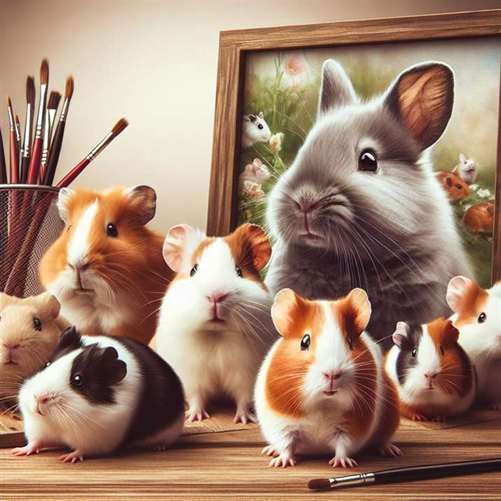Best Small Pet Mammals for Your Home
Introduction
Are you considering welcoming a furry friend into your home? The world of small pet mammals offers a delightful array of options for anyone looking to add a little joy to their lives. From playful hamsters to cuddly guinea pigs, these pets can bring companionship and fun to families, singles, and seniors alike. According to recent studies, small mammals are becoming increasingly popular as household pets due to their manageable size, engaging personalities, and relatively low maintenance compared to larger pets. This trend is not just a fad; it reflects a growing appreciation for the joy these little creatures can bring.
In this article, we’ll explore the fascinating world of small pet mammals. You’ll learn about the most popular species, their unique characteristics, care requirements, and how to choose the right one for your home. Whether you’re a seasoned pet owner or a first-timer, understanding the ins and outs of small mammals can help you make an informed decision.
We will also discuss the benefits of owning such pets, practical care tips, and what you need to prepare before bringing home your new companion. By the end of this article, you’ll be equipped with all the knowledge you need to choose the perfect small mammal for your lifestyle.
Ready to dive in? Let’s discover the joy of pet ownership while exploring the world of small pet mammals! If you’re interested in learning more about responsible pet ownership, check out our pet care tips.
What is small pet mammals?
Definition
Small pet mammals are domesticated species of mammals that typically weigh less than 5-10 pounds and require less space and care than larger pets like dogs or cats. This category includes animals such as hamsters, guinea pigs, rabbits, ferrets, and rats. These creatures are often characterized by their playful nature, intelligence, and affectionate behavior, making them ideal companions for people of all ages.
Historical Context
The domestication of small mammals dates back thousands of years. Initially, these creatures were kept for practical purposes such as pest control or food sources. Over time, they evolved into beloved companions. For example, domesticated rabbits were first bred for meat but later gained popularity as pets. The rise of pet ownership in the 20th century saw a significant shift, with small mammals becoming increasingly recognized as family pets.
Importance of small pet mammals
In recent years, the importance of small pet mammals has surged. Factors contributing to their popularity include:
- Space Efficiency: Living in urban environments often means limited space. Small mammals can thrive in smaller settings, making them ideal for apartment living.
- Low Maintenance: Compared to larger pets, small mammals generally require less time and effort for care, making them suitable for busy individuals or families.
- Affordability: Small mammals tend to have lower initial and ongoing costs than larger pets, making them more accessible for many potential pet owners.
Small pet mammals in the Context of Pet Ownership
The rise of small pet mammals has also shaped the pet care industry. With increasing demand, there are now more specialized products available, including high-quality pet food, enriched habitats, and toys designed specifically for these animals. This shift has resulted in a more informed consumer base that seeks to provide the best care for their small companions.
Key Players or Contributors
Several organizations and individuals have played a significant role in promoting the care and welfare of small pet mammals. Pet care experts, animal rights groups, and veterinary professionals have contributed valuable information and resources to educate potential owners about the unique needs of these pets. Their efforts have led to better understanding and improved care practices within the small pet mammal community.
If you’re interested in learning more about the different species of small mammals, check out the most popular small mammal pets to own.

Benefits of Owning small pet mammals
Owning a small pet mammal can be an incredibly rewarding experience. Here are some of the key benefits:
Companionship
Small mammals offer companionship and affection. They can form strong bonds with their owners, providing emotional support and reducing feelings of loneliness. Many small mammals enjoy being handled, cuddled, and even trained to perform simple tricks.
Educational Opportunities
For families, small pet mammals can serve as a practical way to teach children responsibility. Caring for a pet instills valuable lessons about nurturing, empathy, and the importance of routine. Kids can learn about animal behavior, nutrition, and health, fostering a lifelong respect for all living creatures.
Stress Relief
Research has shown that interacting with pets can reduce stress and anxiety. The simple act of petting a small mammal can trigger the release of oxytocin, a hormone associated with bonding and stress relief.
Low Maintenance
While all pets require care, small pet mammals generally need less attention than larger animals. They often have simpler dietary needs, smaller living spaces, and less need for constant social interaction. This can make them a great choice for those with busy lifestyles.
Variety of Choices
From playful ferrets to gentle guinea pigs, the variety of small pet mammals available means you can find one that fits your lifestyle perfectly. Each species has its own unique characteristics, allowing for a personalized pet experience.
If you’re looking for a specific type of pet, be sure to explore our guide on best small pet mammals for your home.
How to Choose the Right small pet mammals for Your Home
Choosing the right small pet mammal is crucial for your happiness and the well-being of your new companion. Here’s a step-by-step guide to help you make the best choice:
Assess Your Living Situation
Consider your living space and lifestyle. Do you live in a small apartment or a larger home? Do you have children or other pets? Different small mammals have varying needs for space, social interaction, and care.
Research Different Species
Spend time researching the different types of small pet mammals. Here are a few popular options:
- Hamsters: Generally low-maintenance and easy to care for, hamsters are perfect for first-time pet owners. They are nocturnal and enjoy a good amount of exercise in their cages.
- Guinea Pigs: These social creatures thrive in pairs and require a larger cage. They are known for their friendly disposition and vocalizations.
- Rabbits: Intelligent and social, rabbits need plenty of space and daily interaction. They can be litter trained and enjoy exploring their environment.
- Ferrets: Known for their playful antics, ferrets are energetic and require a good amount of playtime and social interaction.
Consider Time Commitment
Think about how much time you can dedicate to your pet. Some animals require more social interaction and playtime than others. If you travel frequently or have a demanding job, you might want to choose a pet that is more independent.
Budget for Care
Owning a pet comes with financial responsibilities. Consider the costs associated with food, bedding, toys, and healthcare. Research the specific needs of the species you’re interested in to avoid any surprises down the road.
Prepare Your Home
Once you’ve chosen your small pet mammal, ensure that your home is pet-proofed. This includes removing hazards such as cords, toxic plants, and small objects that can be swallowed. Create a safe, comfortable space for your new friend.
If you need tips on setting up your pet’s space, check out our article on best small mammal pet cages for every budget.
Caring for Your small pet mammals
Basic Care Tips
Caring for small pet mammals requires attention to their specific needs. Here are some essential care tips:
- Diet: Provide a balanced diet that meets the nutritional needs of your pet. Most small mammals require a mix of pellets, fresh fruits, vegetables, and hay.
- Habitat: Ensure the living environment is clean, spacious, and safe. Regular cleaning of their habitat is crucial for their health.
- Social Interaction: Spend quality time with your pet. Many small mammals thrive on social interaction, which keeps them happy and healthy.
- Health Monitoring: Regularly check for signs of illness, such as changes in appetite or behavior. Schedule routine vet visits to ensure your pet stays healthy.
Common Health Issues
Be aware of common health issues associated with small pet mammals. For example:
- Hamsters can develop wet tail, a serious intestinal disease.
- Guinea pigs may suffer from dental problems due to their continuously growing teeth.
- Rabbits are prone to obesity, so it’s important to provide a balanced diet and regular exercise.
Educating yourself on these issues can help you prevent potential health problems in your pet. For more information on keeping your small pet healthy, visit our article on how to improve small mammal pet health.
Future Trends in small pet mammals
As the popularity of small pet mammals grows, several trends are emerging in the pet care industry:
Focus on Wellness
Pet owners are becoming increasingly concerned about their pets’ wellness. This includes nutrition, mental stimulation, and overall care. Expect to see a rise in products aimed at promoting the
Resource Links:
- reddit.com: … Animals need a home base. Would you be leaving it alone for 6 or 7 hours? Not sure any pet would be great in this situation if I’m honest.
- cdc.gov: … Cleaning pet supplies inside. If cleaning outside the home isn’t possible, clean supplies in a laundry sink or bathtub and clean and disinfect …
- reddit.com: … I’ve played with the idea of raising chickens and maybe even some goats, but am aware my space is limited. Are these good animals to raise or are others more …




0 Comments